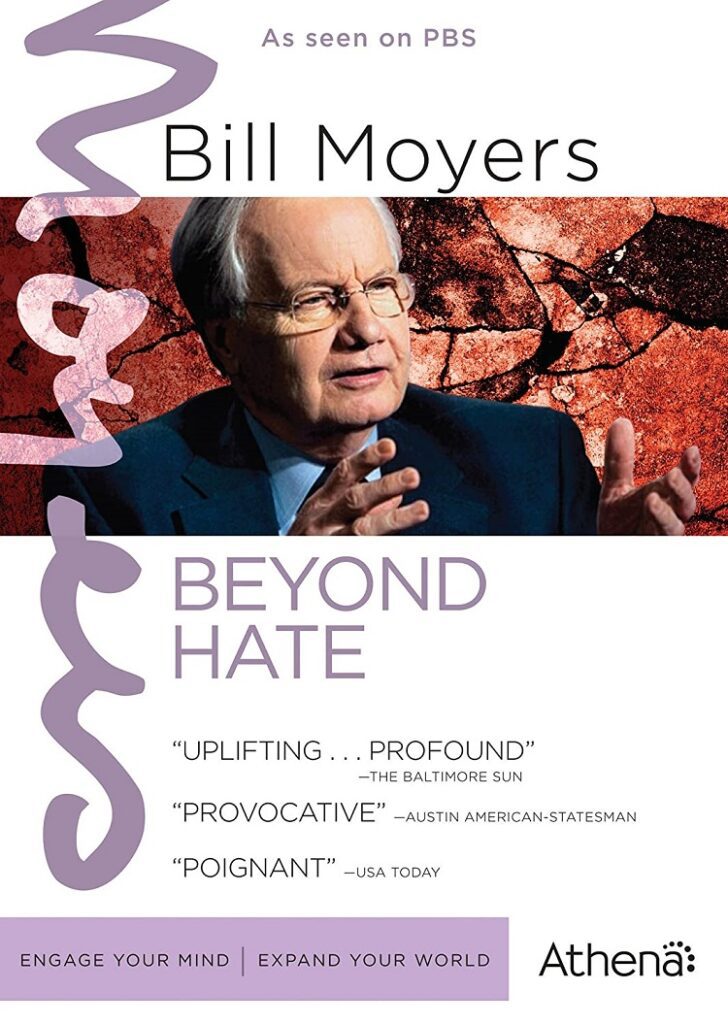
Bill Moyers once again provides compelling and timeless programming with Beyond Hate, a documentary that first aired in 1991. The special has been released on DVD by Athena with the bonus program Facing Hate, a 58-minute interview with Moyers and Elie Wiesel. There is also a 12-page booklet that outlines some historical context.
Beyond Hate provides a lucid exploration of a complex subject, discovering hate in many forms and locations and discovering an interesting sense of continuity. Watching the documentary in 2013 reveals that little has changed in our cultural landscape; indeed, it appears we have new avenues down which we can hate and new opportunities to spread our respective messages of animosity.
Moyers sets out to delve into the roots of hatred and to discover if there is a method to the madness. He ventures from South Central Los Angeles to Jerusalem, even visiting the Anatomy of Hate conference in Norway and speaking to such luminaries as Jimmy Carter and Nelson Mandela.
But how is hate defined? To have Wiesel tell it, hate is “when a person wants to aggrandize himself at the expense of the other.” Hate becomes directed toward the almighty Other and the process of dehumanizing the so-called Other helps underpin the ease with which loathing can spread.
Furthermore, objects of hatred – whether ethnic and religious groups or individuals – must be made to “deserve” to be despised. Moyers’ documentary explores this through “fright masks,” as when a government converts humans into caricatures. It is no accident that the white supremacist Tom Metzger used an adjusted form of government propaganda in his own hate literature. When the hood fits…
Beyond Hate suggests rightly that hate thrives when people cease to matter as people, when we tell ourselves that a particular group or individual “can’t possibly” feel as we do. This mentality is prevalent in many seemingly good-natured circles, from the amicable racism of “friends” who recoil at the sight of ceremonial Sikhs to the wide-eyed doggedness of family members that Indians “simply aren’t like us.” It is treacherous in its nonchalance.
In the same way, hate can become a facet of our alleged moral outrage. From a philosophical or religious context, we select our set of worldviews and naturally assume we’ve selected the right ones. But if we see others selecting views incompatible to our own, we can imagine those people as “bad.” And if we can imagine them as “bad,” we can feel very “good” for hating them.
The seeds of hatred are everywhere, from shared spaces of neighbours to mentalities toward distant parts of the world. But what is the source of it?
Moyers’ documentary points to several possibilities, from inborn instincts to economic inequality. When one considers the realities of South Central LA, for instance, the economic factors play a key role in turning the poor against each other rather than against the system that imprisons them. Moyers goes a step further, illuminating military prospects as ways to “refine” hate and direct it to faceless scapegoats.
Beyond Hate also explores the differences between hostility and anger, the latter of which can be a constructive concept, and charts the rather short path between hatred and fear.
Over the course of its 87 or so minutes, the documentary asks a lot of pointed and poignant questions and never quite arrives at answers. An updated version would have many of the same questions, although the subjects might alter somewhat. If it is indeed possible to have a world Beyond Hate, we are a long way off.